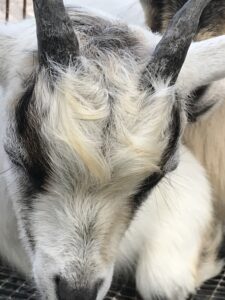I was city through and through. And then we moved to rural southern Illinois. Pausing to check messages in a parking lot, I near dropped my phone when a rooster crowed in the back of the rusty red pickup next to me. On one of my first trips to Rural King, a horse strolled in be fitted for a halter. Nobody honked when a tractor chugged along the highway. Everything stopped for the county fair.
Everything stopped for church, too. Sunday mornings, Waterloo was a holy ghost town. So I was surprised to learn that the ritual Monroe County Animal Swap is held on a Sunday morning, the fourth of every seasonable month.
Granted, the Swap starts at 5 a.m.; there is plenty of time to get home, slip out of jeans spattered with chickenshit, tenderly set the duck eggs or tree cuttings or real honest-to-God tomatoes on the counter, and high-tail it to church. But as a bored agnostic, I decide to see for myself just what sort of secular enterprise is even allowable on a Sunday morning.
I park in grass as high as the top of my tires, and a kid sitting on the roof of his pickup watches, eyes hooded, as I squish through cold mud to the first attraction, a giant crate of wriggling puppies. Next come rabbits, a Flemish New Zealand mix. “These are bred, so they get a little cranky,” the farmer says. “Hormones.” I know the feeling.
 They like petting and carrots, he says, and cornflakes, and oatmeal. As we talk, a truck grinds past on the gravel road, and I hear the ruffled sound of dozens of wings beating. The fairgrounds are alive with the squawks of hens, the quacks of Muscovy ducks, the bleating of pygmy goats. Late autumn’s burnished sunlight bounces off a stand of bright green plants, deep purple figs, fat orange pumpkins. An older man, wiry and pony-tailed, is selling garden boots, children’s Crocs, inner-tubes for floating downriver, tote bags that say “Jam” or “Bananas.”
They like petting and carrots, he says, and cornflakes, and oatmeal. As we talk, a truck grinds past on the gravel road, and I hear the ruffled sound of dozens of wings beating. The fairgrounds are alive with the squawks of hens, the quacks of Muscovy ducks, the bleating of pygmy goats. Late autumn’s burnished sunlight bounces off a stand of bright green plants, deep purple figs, fat orange pumpkins. An older man, wiry and pony-tailed, is selling garden boots, children’s Crocs, inner-tubes for floating downriver, tote bags that say “Jam” or “Bananas.”
“I’ve been coming up here for 28 years,” the man at the next stand tells me. “Used to be, all there”—he drags his finger across an expanse—“was lined up with stands on both sides. You had to ‘Pardon me, ’scuse me, sorry’ to get through.” These days, he sighs, the grounds are empty by 9 a.m., and the sellers are heading home.
“Y’all need some chickens?” he asks a mother and daughter. “That’s an Americana, she’ll lay a colored egg. Could be blue, pink, tan. And I’ve got the Blue Splashes right next to her.”
I ease away from the eggs of many colors and beeline for a stand lined with glass jars: pickled eggs, dillybeans, cherry pickles, black licorice jelly, Black & Blue (blackberries and blueberries, I have to be told). Here I dither, not sure whether to buy jalapeno peach or blackberry with ghost peppers or plain pepper jelly.
“People are liking the peach,” the woman behind the stand tells me. “We were in Nashville yesterday, had to leave out of there at 2 a.m. to get here. It’s funny how each town does the same thing. A little boy said, ‘Do you have strawberry?’ and a minute later, I look up and there’s a whole line of Boy Scouts waiting to buy strawberry jam.” More children gathered the next day, bought all she had.
Her name is Kim Gross, and she’s only been working with the guy behind this stand, Jeff Derickson, for a few months, so it’s all still fresh for her. “So many people went after the Reaper salsa,” she marvels. “Oh, and the alcohol jelly! The women like that. Strawberry daiquiri is my favorite.”
“Why just the women?” I ask.
“’Cause beer is normal for a guy,” Derickson tells me. “And when you cook the jam, you cook out all the alcohol, anyway.” Fixed truths still hold here.
We talk about his Reaper and Ghost peppers; I grew Ghost peppers this year for the fun of it and now can’t find a way to render them edible. We agree to trade my harvest for his homemade wine, as we both have an abundance and cannot abide waste.
Tucking my pepper jam into my purse, I mosey down the path, the tang of manure tingling my nose, and ask a kindly older man how he managed to grow such luscious figs when mine refused to ripen.
“It was a weird summer,” he assures me. His didn’t even start to ripen until late September, and he pulled off some leaves so they could get more sun. Come spring, he says, I can do a little propagating: “Just stick the green stuff in the ground, and it’ll get roots. But it comes in its own time, might take till June or July. Don’t get anxious with it.”
Words I often need preached. Sun on my shoulders and a calm settling inside me, I move on to the next stand, where a thickset man with a broad, open face is talking about his pawpaws. “I collected the seeds for these last year. She makes pawpaw bread.” (This usage riled me when we first moved here: The spouse receives only the pronoun, said as if capitalized. Never the proper name or even “my wife” or “my husband,” just She or He. It seemed rude. Now, I hear it as an acknowledgement of permanence.)
“What happens is, they grow roots first, then pop this thing up, and it’ll look really small and tidy, and they just start rolling, bigger and bigger,” he is saying. “They love water. I’ve got mine next to a creek.”
 His name is Carl Wheeler, and he is Swedish-German, which he teasingly pronounces as “sweetest German.” He cross-pollinated his pawpaw to double their sweetness. He despises cloned plants and always sows good seed, he says; I am tempted to ask if any of it is mustard seed. He grows papyrus, too, and raises chickens and quail, and shows pedigreed rabbits. He is tender toward them all, but especially the smallest, who “can be nippers” because they feel defenseless. He plants fig trees to shade the rabbits’ houses: “Once the leaves get close enough, they pull them in and eat them.”
His name is Carl Wheeler, and he is Swedish-German, which he teasingly pronounces as “sweetest German.” He cross-pollinated his pawpaw to double their sweetness. He despises cloned plants and always sows good seed, he says; I am tempted to ask if any of it is mustard seed. He grows papyrus, too, and raises chickens and quail, and shows pedigreed rabbits. He is tender toward them all, but especially the smallest, who “can be nippers” because they feel defenseless. He plants fig trees to shade the rabbits’ houses: “Once the leaves get close enough, they pull them in and eat them.”
Feeling confessional, I tell him about my hard little green figs.
He frowns. “What kind do you have?”
“Chicago Hardy,” I say proudly, because I researched, city-style, exactly what fig trees would tolerate southwestern Illinois winters, and that is what Google told me again and again.
“Aw,” he says, disappointed for me. “They won’t ever get really big and flavorful. The best fig for growing around here is the brown turkey fig.” He describes his method of air-layering propagation, something complicated about damp-but-not-wet peat moss in a black, opaque tube… I grasp none of it but love his specificity, his intimate knowledge of these plants, his reverence for all that is nature.
“They’re beautiful trees,” he finishes, and offers to bring me a bareroot cutting.
It is late now, by modern Swap standards. People have carried home their purchases, and trailers are inching out of the lot. Tiny feathers litter the ground, waft a few inches into the air. The fairgrounds feel deserted.
Church is over.
